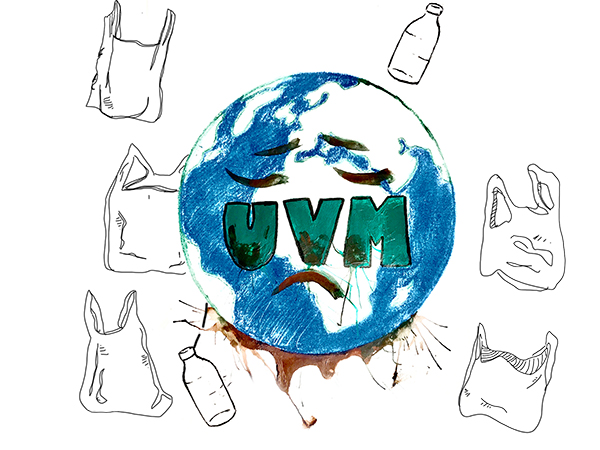Say no to single use plastics and fossil fuel
May 2, 2019
The University of Vermont is known for being green. It’s in our school colors, our environmental sciences and studies programs and our track record for environmentalism.
But I’m concerned the University isn’t taking climate change, and the University’s contribution to it, seriously enough.
There are many things that the University needs to do differently to allow members of the community to truly reduce their carbon footprint.
One of these things is the move led by student activists to end the use of single-use plastic bags at the UVM Bookstore.
Single-use plastics are an environmental disaster, and the quicker we transition away from them, the better off we will be.
But even if a UVM student were to completely cut out all single-use plastics and buy non-plastic packaged items, their impact could never reach zero.
And that’s because part of UVM’s endowment goes toward the University’s fossil fuel investments.
The University invests a portion of its endowment on fossil fuel investments every year to “maximize returns” on its investment, according to an April 2013 Vermont Public Radio article.
Students have protested UVM’s investment in fossil fuels for years, according to an October 2017 Cynic article. But the same article documents the board of trustees rejecting the idea.
It’s hypocritical for the University to bill itself as “environmentally friendly” and still profit from the destruction of the Earth.
The University also retains a longtime partnership with TD Bank. The Dakota Access Pipeline was largely financed by TD Bank, according to a June 2015 GreenPeace article.
The Dakota Access Pipeline is infamous for its violation of Native American treaties, according to a March 2017 National Public Radio article.
The University has also been asked to divest from TD Bank by student activists, but has yet to do so, according to an April 2017 Cynic article.
The University should follow student activists’ lead in giving the student body the greatest ability possible to reduce their environmental impact.
Students shouldn’t have to worry about the school that they attend contributing to the destruction of the Earth.







